Artificial Intelligence & Automation In B2B SaaS Platforms In this ever-evolving business environment, the incorporation of AI and automation in B2B SaaS facilities is reshaping the ways of working, innovation, and value delivery. These are not just buzzwords; rather these are powerful forces that are transforming industries and creating never-seen-before opportunities for growth and efficiency.
Over the past few years, the B2B SaaS market has been booming as many companies are switching to SaaS/cloud-based solutions to save effort and boost business productivity. And now, with AI and automation capabilities being integrated directly into these platforms, we’re seeing a paradigm shift around what these tools are capable of and the value they can provide.
Jump to:
Why AI-Powered SaaS is Unlike Any Other Software Solution
For many years, traditional SaaS solutions have given businesses accessible, scalable software hosted in the cloud. But, SaaS with AI enables it to reach a whole new level. Traditional software follows a set of rules and workflows, AI-enhanced solutions are capable of learning over time and improving.
The real differentiation is how these systems consume information. Conventional software operates by following explicit programming instructions: if X, do Y, for every possible X that the programmer can anticipate. AI systems, on the other hand, can discern patterns in data, make predictions, generate insights and even take independent actions without programmers explicitly specifying how to respond in every single situation.
This ability goes beyond automating tasks and allows SaaS to evolve into cognitive/brain-like assistants that can comprehend context, predict requirements, and even make recommendations. For B2B firms, this implies the software is worth more as it gets smarter over time by learning patterns from behaviors and changing to meet business needs.
How is AI Automating Core Business Processes in B2B Companies?
AI automation’s impact is being felt across nearly every business function:
Sales and Marketing Automation
Artificial Intelligence is changing the way B2B companies find prospects, follow up leads, and close deals. It leverages advanced algorithms to analyze massive quantities of customer data, helping to pinpoint top-tier prospects, anticipate buying behaviors, and suggest tailored outreach strategies. Sales teams can now spend more time building relationships and closing deals, while chatbots are taking care of the first level of customer interaction, lead qualification, and meetings.
AI lays the groundwork for further scalability, as marketing teams use it to pinpoint top-performing campaigns, personalize content in bulk, and determine the best outlets for reaching their target audiences. These are particularly useful in the B2B domain, where the sales cycles are longer and more complex than B2C sales cycles.
Related Article: https://www.adlabz.co/saas-digital-marketing-in-2025
Customer Support and Success
Customers expect phenomenal experiences in this crowded B2B landscape, and AI is helping companies elevate support capabilities. Some AI-based chatbots and virtual agents are available 24/7, providing instant responses to FAQs, simple issues can be handled without a human agent.
More advanced AI tools can analyze customer interactions to gain a sense of sentiment, escalate complicated issues to human representatives, and even anticipate issues before they happen. This approach of being proactive about customer success is allowing B2B SaaS businesses to lower churn rates and improve customer lifetime value
Finance and Billing Operations
AI automation is improving accuracy, decreasing manual labor, and enhancing fraud detection for finance departments. AIs can read invoices, match up purchase orders, reconcile accounts, and spot anomalies that may point to errors or fraud.
Subscription billing, the foundation of the SaaS business model, is being optimized with AI systems capable of predicting the likelihood of renewal, spotting upsell opportunities, and addressing billing issues before they have a negative impact on customer satisfaction.
Product Development and Innovation
AI speeds the product iteration cycle by leveraging user behavior analytics to understand feature shortcomings and predict which upgrades will create the most value. These learnings enable B2B SaaS businesses to better prioritize where to develop and deliver more focused solutions.
AI-driven automated testing tools can catch bugs and performance issues before they reach customers, ensuring bugs are caught earlier in testing and before product releases leading to better products with fewer post-release fixes needed.
How Are Data Security and Privacy Concerns Being Addressed?
Security and privacy issues have also taken center stage as AI systems need large data to work effectively. B2B SaaS vendors are tackling these challenges in a variety of ways:
Enhanced Security Protocols
Ironically, AI itself is being employed to enhance security protocols, with algorithms that can identify patterns of behavior that could represent a breach, or that point to unauthorized access. These systems adapt with learning to new threat vectors, making them more potent than any traditional rule-based method of implementing security.
Fair and transparent data use policies
Concerned B2B SaaS vendors are turning to explicit, cross-cutting data use policies that explicitly detail how they will use, store, and protect customer data. This openness is crucial to establishing trust with business clients who are growing more wary of how their data is being administered.
Compliance Automation
B2B SaaS companies are using AI-powered compliance tools to help them navigate complex regulatory environments such as GDPR, HIPAA, and others specific to their industries. Such systems can automatically implement appropriate controls, as well as produce any documentation required, and even notify administrators of potential compliance issues.
How Are AI and Automation Changing the SaaS Pricing Model?
AI capabilities are driving the pricing architecture of B2B SaaS companies:
Value-Based Pricing
As AI starts generating more quantifiable business results, many providers are pivoting toward value-based pricing models tracking costs to the direct value it provides customers. While this method requires robust monitoring of key metrics, it will ultimately lead to more revenue as clients start to see the tangible value they’re getting.
Tiered AI Capabilities
AI functionalities are being offered by many B2B SaaS platforms on tier-based pricing. Basic plans may cover asynchronous automation, whereas premium levels offer proactive predictive analytics, tailored AI models, and exclusive machine learning resourcing.
Usage-Based Components
For more demanding computationally intensive AI features, such as when a company applies the API to large datasets or builds custom models, companies are embedding usage-based pricing components. This means that costs stay fairly applied regardless of how much one uses the platform, or their data.
What Does the Future Hold for AI in B2B SaaS?
A few trends are going to shape the evolution of AI in B2B SaaS in the coming future. Because AI tools are becoming more widely available, even smaller providers will incorporate advanced capabilities, increasing both competition and innovation. Many organizations adopt specialized third-party AI models, deploying faster, with no need for in-depth technical know-how.
The integration of AI will move beyond the automation of tasks, from a human-based to AI-assisted means of solving tasks. Moreover, explainable AI will become increasingly important as companies require transparency to AI-generated decisions, particularly in regulated fields that rely on accountability. These advancements will establish a more collaborative, trustworthy, and integral AI to B2B SaaS solutions.
What Are the Leading AI Automation Tools Transforming B2B SaaS?
The market for AI-powered automation tools in the B2B space has exploded in recent years. Here are some of the most impactful solutions across different business functions:
Sales and Marketing Automation Tool
Salesforce Einstein
Salesforce Einstein is the embedded AI layer across Salesforce’s CRM platform, which introduces intelligent automation to sales, marketing, and service activities. Its predictive lead scoring entails analyzing historical data, interactions with customers, and engagement patterns to rank orders in likelihood of conversion. This enables sales teams to rigorously target high-opportunity candidates, increasing effectiveness and closing speeds.
Einstein’s also automates repetitive tasks like data entry by pulling relevant information from emails, calls, and meetings and logging it automatically into Salesforce records. This minimizes manual efforts and ensures data accuracy — enabling the sales reps to spend more time with prospects. Moreover, Einstein’s AI-powered forecasting analyzes historical trends and live pipeline data to build accurate revenue forecasts that aid businesses make better decisions.
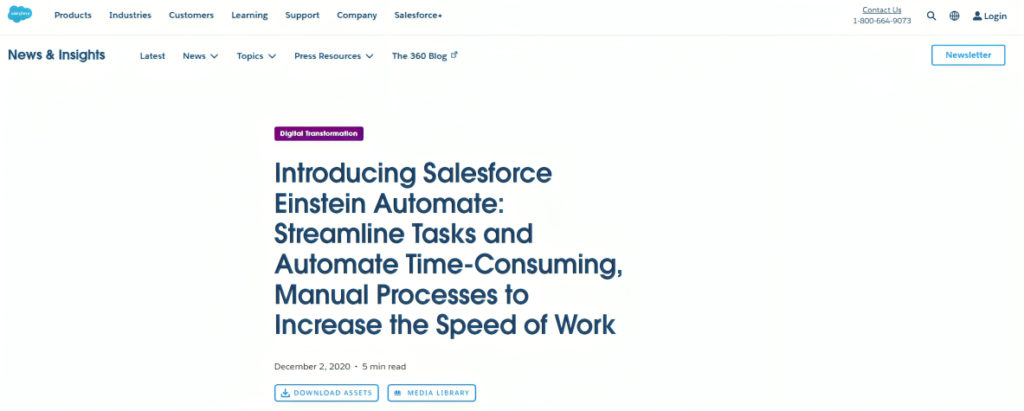
Einstein is so deeply integrated within Salesforce workflows that it helps sales teams work smarter—not harder—by surfacing the right leads, reducing administrative work, and closing deals faster than ever with actionable insights.
Customer Support and Success Automation
Intercom Resolution Bot
The Intercom Resolution Bot is an AI-powered customer support assistant that can take care of routine inquiries without the need for human assistance. Using natural language processing (NLP) and machine learning to understand customer questions, it delivers real-time, accurate answers, whether they are FAQs how-to-debug steps, or even account information.
The bot works within Intercom’s messaging platform, which means it can tap into knowledge bases, previous tickets, and product documentation to answer common problems, such as password resets, order status, or billing questions. If the query is overly complex, it intelligently passes the conversation to a human agent and gives them context for a smoother transition.
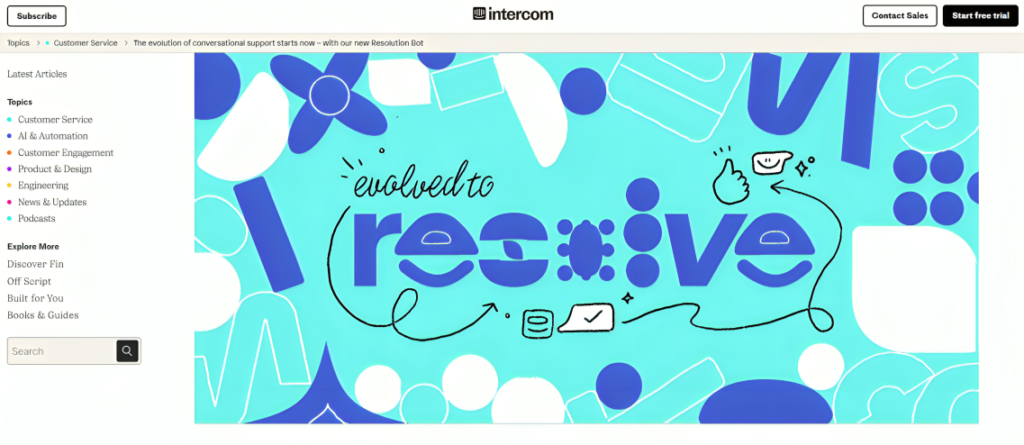
Intercom catches leading customer service trends and provides the right tools to its users to grab the horizon.
Operations and Workflow Automation
UiPath:
A leading RPA (Robotic Process Automation) platform that enables companies to automate repetitive, rule-based tasks with AI and machine learning. Using “bots” to automate human interaction with digital systems like data entry, invoice processing, report generation, and emails across several applications, including ERPs, CRMs, and legacy systems.
UiPath differentiates itself with AI-driven abilities that allow for more complex automation. Document Understanding (reading invoices or email), computer vision (clicking the on-screen, etc), and natural language/ processing (NLP) provide hurdles for the platform’s capability to feature semi-structured or unstructured data. It cuts down on errors, accelerates workflows, and removes manual bottlenecks.
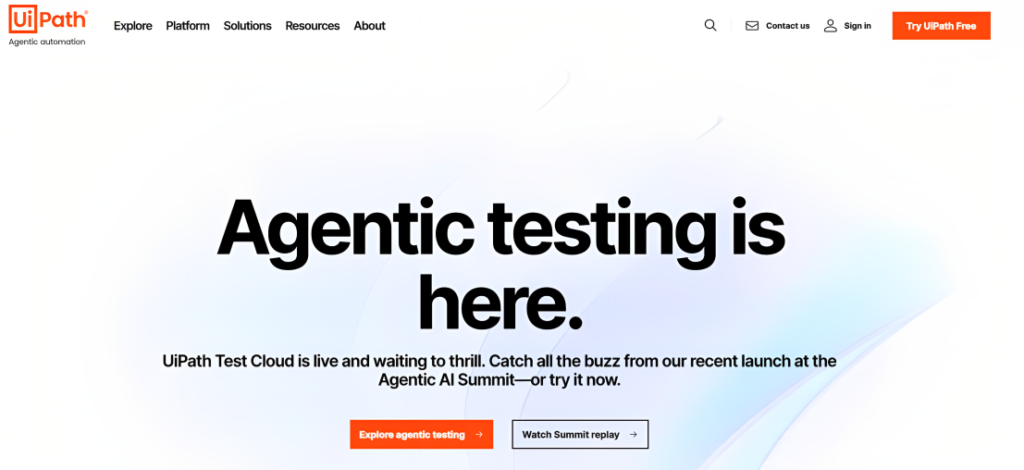
With drag-and-drop automation tools and pre-built AI integrations, UiPath also makes it easier for enterprises to scale their automation efforts with limited coding knowledge. The result? Higher productivity, reduced operating costs, and the opportunity to redeploy human expertise in strategic, high-value work. From finance to healthcare, the user-friendly yet sophisticated systems UiPath has are changing the way companies do business, combining RPA efficiency and AI brainpower.
Data Management and Analytics Automation
Alteryx
Alteryx is a comprehensive data analytics and AI platform that streamlines intricate data workflows, empowering business users to engage in advanced analytics without extensive technical knowledge. Alteryx makes the entire data lifecycle quicker by combining automation through drag-and-drop functions and AI insights; from preparing and blending data to predictive modeling to reporting.
This platform is great for automating mundane data tasks like cleaning up messy datasets, joining multiple sources, and running predictive analytics. It comes with AI and machine learning tools to help users surface trends, predict outcomes, and deliver actionable insights all without complex programming. Features such as AutoML (Automated machine learning) and natural language processing (NLP), assist the business in quickly building and deploying models for Customer Segmentation, Demand Forecasting, Risk Analysis, and more.
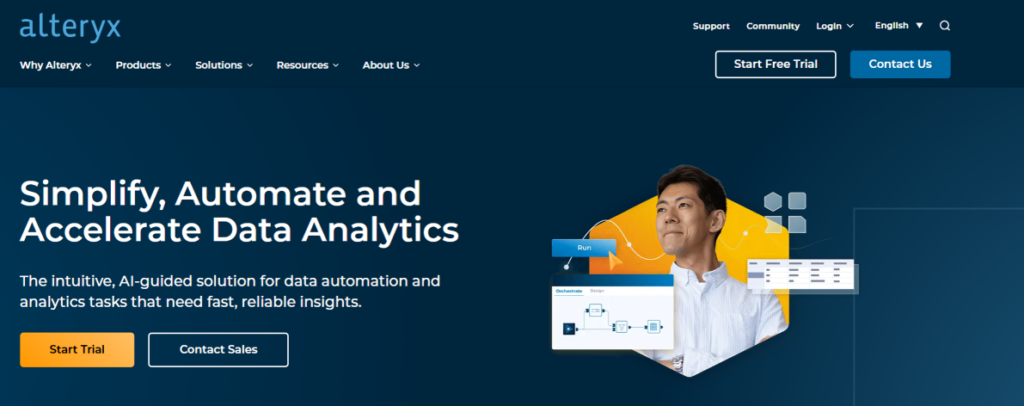
Using Alteryx’s intuitive interface, teams across finance, marketing and operations can speed more data-led decision-making— cutting the need to depend on IT or data scientists themselves. The result? The smarter, faster, data analytics powered at scale enable organizations to translate raw data to the strategy.
Financial Operations Automation
Bill.com
Bill.com‘ text: ‘com is the AI-powered financial Automation Platform that is transforming accounts payable (AP) and accounts receivable (AR) for businesses. The platform removes the need for manual data entry to minimize errors and speed up cash flow using machine learning and intelligent automation.
For accounts payable, Bill. com’s AI automatically pulls out important information from invoices using optical character recognition (OCR) and smart data capture— including vendor names, amounts, and due dates. It then aligns invoices to purchase orders and approvals, flagging discrepancies for review. The platform even predicts the best times at which to make payments to maximize early payment discounts, as well as to steer clear of late fees.
On the accounts receivable side, the platform automates the delivery of invoices, payment tracking, and transaction reconciliation in real-time. Best of all, its AI-powered payment matching ensures the correct and timely application of customer payments to reduce manual follow-ups, improve collections efficiency, and optimize operational efficiency.
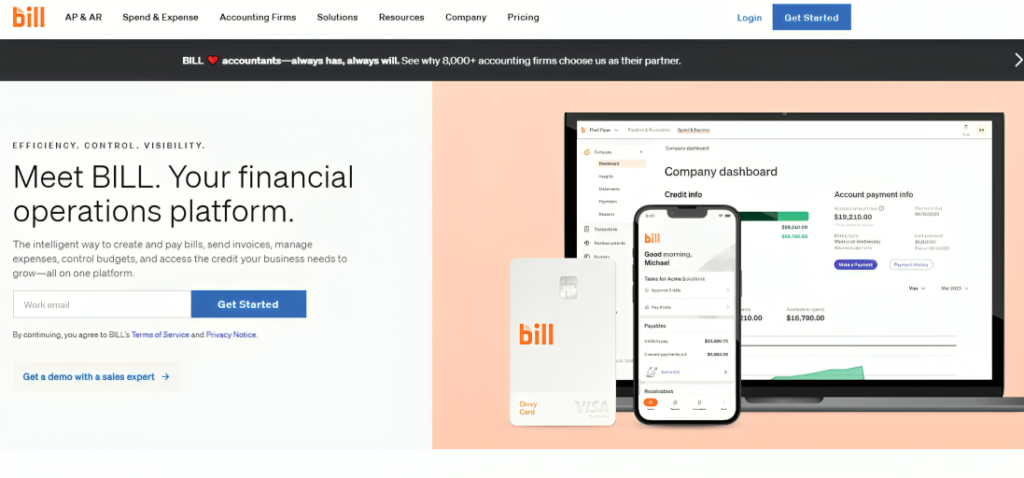
Bill enables businesses to streamline their financial processes through the digitization and automation of their financial workflows. com, helping businesses reduce their processing costs by 50% or more, reduce fraud risk, and free up finance teams to focus on high-value activities — while protecting seamless, audit-ready compliance.
How Can Businesses Prepare for the AI-powered SaaS Future?
Organizations seeking to capitalize on the opportunities presented by AI-augmented B2B SaaS programs should implement many strategic initiatives:
The only really big caveat to all of this, of course, is that the usefulness of AI systems depends quite a lot on relevant data being highly available and of the appropriate quality. The importance of building clean data environments and integration points between systems should always be put first by companies!
Although specialized AI skills will continue to be in demand, basic knowledge of AI will also become increasingly important among workers in various functions. Related: Business leaders: Stop making rules about generative AI — and start educating funded companies need to create and invest in training courses that can ensure that employees have access to information about generative AI — its capabilities, limitations, and how and where to safely use it.
Instead of trying to change everything all at once, organizations should seek business processes where AI can provide almost immediate value while minimizing disruption. These initial wins create momentum and offer lessons for more ambitious projects.
AI systems are becoming increasingly integral to the fabric of business, so rational governance frameworks are critical. These should cover topics such as data usage, decision-making authority, bias tracking, and ethical considerations related to the organization’s sector and values.
Conclusion: Embracing the AI-Powered Future of B2B SaaS
The Next Step in Business Software Evolution From simple task execution to intelligent assistance, prediction, and optimization, these platforms help organizations work smarter, faster, and more effectively.
Businesses that leverage these capabilities—whether as providers or consumers of B2B SaaS—will enjoy major competitive advantages in efficiency, customer experience, and innovation. As AI matures further, we should anticipate even more transformative applications that continue to blur the line existing between human and machine capabilities.
The most successful organizations will not deploy AI-powered tools but integrate these capabilities into their broader business strategy, unleashing new forms of value that previously weren’t possible. The only way to stay ahead is to be adaptable and learn continuously in this fast-evolving technology.
You might also be interested:


